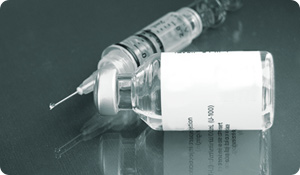
It's estimated that global diabetes rates will rise to 300 million in 2025, up from 135 million just over a decade ago. The rise is being attributed to the surging rates of insulin resistance linked to obesity. When insulin resistance coincides with obesity (especially abdominal obesity), cholesterol problems and high blood pressure, it's referred to as the metabolic syndrome or the insulin resistance syndrome.
The most likely causes of insulin resistance and the metabolic syndrome are excess calories and physical inactivity. Some researchers have also linked skyrocketing insulin resistance rates to aspartame, a low-calorie natural sweetener. Immunization is another possible factor. Studies have shown that people can develop insulin resistance and diabetes after receiving standard vaccines.
According to researchers, when some people receive vaccines or other strong immune stimulants they develop a hyperactive immune system leading to autoimmune destruction of insulin secreting cells. In other people, the pancreas produces an increased amount of cortisol, which suppresses the vaccine-induced inflammation. This leads to type 2 diabetes and metabolic syndrome.
Insulin resistance has no symptoms initially, and it progresses very slowly. Once you have it, it can advance quickly. Fortunately, there are steps you can take to prevent insulin resistance, or reverse it.
How Does Insulin Resistance Happen
Insulin produced by the pancreas regulates blood glucose or blood sugar levels. It helps to carry glucose from the blood into the cells so your body can use it as energy. When your blood glucose levels rise, so does the production of insulin.
When you have insulin resistance, your body still produces insulin but the cells in muscles, tissue and fat become resistant to the insulin and block out glucose. In response, your pancreas churns out more insulin to try to regulate blood glucose levels, and insulin levels rise. Eventually your pancreas stops producing enough insulin to regulate blood sugar and you could develop prediabetes or diabetes.
Risk Factors For Insulin Resistance
Some medications, stress, and steroids can trigger insulin resistance, but there are other factors to take into account. According to the American Diabetes Association (ADA), you're more likely to develop insulin resistance if you:
- are overweight or obese
- are physically inactive
- large waist circumference
- have a parent or sibling with type 2 diabetes
- have polycystic ovary syndrome
- are over 45 years old
- have a blood pressure over 140/90 mmHg
- have low HDL (good) cholesterol levels
- have high triglyceride levels in your blood.
Side Effects Of Insulin Resistance
Type 2 diabetes is the most common complication of insulin resistance. However, it's also linked to:
- high cholesterol
- coronary heart disease and stroke
- certain types of cancer
- fatty liver
- arteriosclerosis
- reproductive abnormalities in women
How To Prevent Insulin Resistance
-
Cut calories. Lower your total intake of calories to help regulate your blood sugar levels. Also, choose foods that have a low glycemic index (they don't cause your blood sugar levels to surge), such as whole grains, vegetables, and legumes. Processed foods, white breads, rice and pasta are examples of high glycemic foods you should avoid. Also cut back on saturated fat intake.
-
Increase physical activity. Try to get at least 30 minutes of exercise five days a week. Activities can include walking, jogging, gardening, housework, swimming, biking, weight training, yoga, or playing with your children.
-
Lose weight. The ADA reports that even a loss of 10 pounds can reduce your risk of insulin resistance. Calorie reduction and exercise should help you lose weight. Also try to get more sleep, which aids weight loss.
-
Lower your blood pressure. Losing weight, more exercise and less salt in your diet are just a few ways to prevent hypertension.
-
Quit smoking. Cigarette smoking increases cortisol levels in the body. To prevent insulin resistance and diabetes seek professional help to quit smoking if your own efforts have failed.
-
Learn medication side effects. Ask your doctor if any drug he prescribes for you has a risk of insulin resistance.





